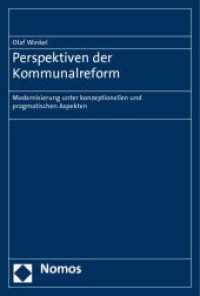- ホーム
- > 洋書
- > 英文書
- > Nature / Ecology
基本説明
世界各国の専門家により、気候変動の科学、その影響、緩和、適応、政策について包括的にまとめられている。
Full Description
Bringing together many of the world's leading experts, this volume is a comprehensive, state-of-the-art review of climate change science, impacts, mitigation, adaptation, and policy. It provides an integrated assessment of research on the key topics that underlie current controversial policy questions. The first part of the book addresses recent topics and findings related to the physical-biological earth system. The next part of the book surveys estimates of the impacts of climate change for different sectors and regions. The third part examines current topics related to mitigation of greenhouse gases and explores the potential roles of various technological options. The last part focuses on policy design under uncertainty. Dealing with the scientific, economic and policy questions at the forefront of the climate change issue, this book will be invaluable for graduate students, researchers and policymakers interested in all aspects of climate change and the issues that surround it.
Contents
Dedication; Foreword; Part I. Climate System Science: Preface; 1. The concept of climate sensitivity: history and development; 2. Effect of black carbon on mid-troposphere and surface temperature trends; 3. Evaluating the impacts of carbonaceous aerosols on clouds and climate; 4. Probabilistic estimates of climate change: methods, assumptions and examples; 5. The potential response of historical terrestrial carbon storage to changes in land use, atmospheric CO2 and climate; 6. The albedo climate impacts of biomass and carbon plantations compared to the CO2 impact; 7. Overshoot pathways to CO2 stabilisation in a multi-gas context; 8. Effects of air pollution control on climate results from an integrated global system model; Part II. Impacts and Adaptation: Preface; 9. Dynamic forecasts of the sectoral impacts of global warming; 10. Assessing impacts and responses to global-mean sea-level rise; 11. Developments in health models for integrated assessments; 12. The impact of climate change on tourism and recreation; 13. Using adaptive capacity to gain access to the decision-intensive ministries; 14. The impact of climate change on Africa; Part III. Mitigation: Preface; 15. Representing energy efficiency in bottom-up models; 16. Technology in an integrated assessment model: the potential regional deployment of carbon capture and storage in the context of global CO2 stabilisation; 17. Moving toward a hydrogen economy: light duty vehicles; 18. The role of expectations in modelling costs of climate change policies; 19. A global perspective on terrestrial carbon sequestration; 20. Terrestrial mitigation of GHGs, US perspective Bruce A.; 21. Global agricultural land use data for integrated assessment modelling; 22. Past, present and future of non-CO2 analysis; 23. How (and why) do climate policy costs differ among countries?; 24. Lessons for mitigation from the foundations of monetary policy in the United States; Part IV. Policy Design and Decision Making Under Uncertainty: Preface; 25. Climate policy design under uncertainty .; 26. Climate policy assessment using the Asia-Pacific integrated model; 27. Price, quantity and technology strategies for climate change policy; 28. Uncertain climate thresholds and the economic value of information; 29. Prudent policy or boiling frogs: can standard two-period decision models give false justification for waiting for action?; 30. Long-term climate stabilisation: methods and models for decision-making under uncertainty; 31. Whither integrated assessment? Reflections from the leading edge; 32. Moving beyond concentrations: the challenge of limiting temperature change; 33. International climate policy: approaches to policies and measures and international coordination and cooperation; Index.








